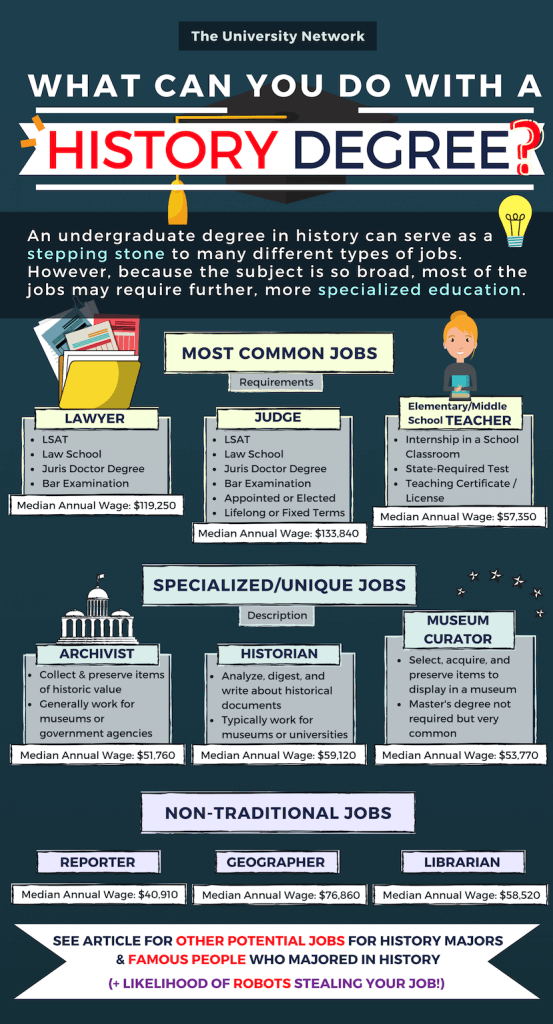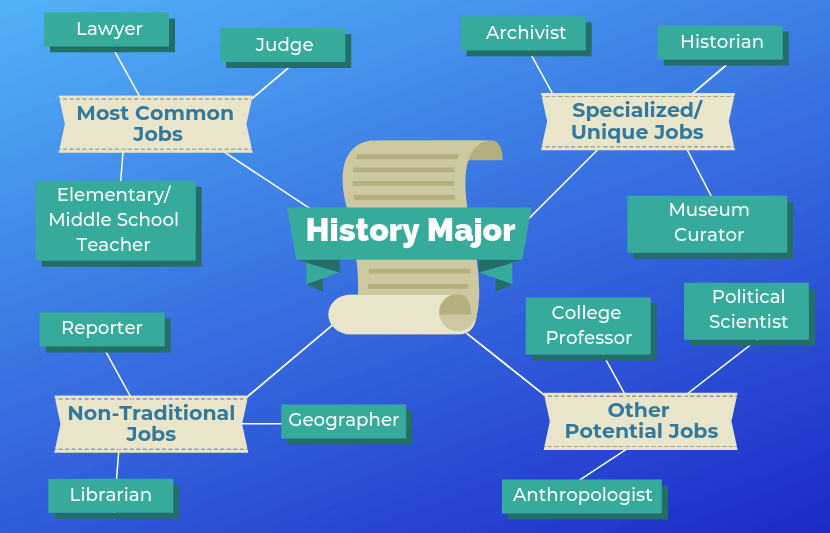History Majors

If you’re interested in the humanities (reading, writing, analyzing culture, etc.), but you aren’t sure what you want to do after graduation, becoming a history major is a good choice. An undergraduate degree in history can serve as a stepping stone to many different career paths for history majors. However, because the subject is so broad for history students, most of the jobs may require further, more specialized education.
Here is a list of 12 possible jobs for history majors:
Most Common Jobs for History Majors

1. Lawyer
Many people who study history go on to be lawyers, but, to do so, completing a bachelor’s degree program is just the first step. If you want to become a lawyer, you will also have to pass the Law School Admissions Test (LSAT), apply to law school, earn a Juris Doctor degree and pass the Bar examination — all before you can begin to practice law. Generally, it takes 3 years to graduate from law school, so the entire process takes 7-8 years
Median annual wage: $119,250
Common entry-level degree: Juris Doctor degree
Likelihood that robots will take your job: 4%
2. Judge
While it can be very rewarding, becoming a judge is no simple task. Aspiring judges often work as lawyers for years before being appointed or elected to a judge position. While some federal judges are asked to serve lifelong terms, the majority of judges have fixed terms, and have to face re-election every few years to renew their position.
Like those who want to be lawyers, aspiring judges also have to attend undergraduate school, pass the LSAT, apply to law school, earn a Juris Doctor degree and pass the Bar examination.
Median annual wage: $133,840
Common entry-level degree: Juris Doctor degree
Likelihood that robots will take your job: 40%
3. Elementary/Middle School Teacher
After earning a bachelor’s degree, those who aspire to teach in elementary or middle schools have to complete an internship in a school classroom, pass the state-required test for teachers and receive a teaching certificate/license.
If you are dead set on being a teacher, the best advice would be to major in education. But if you’re still uncertain about what you want to do, a history major could ultimately help you land a teaching job. As long as your degree is in a related field to the classes you aspire to teach, you will be okay.
Median annual wage: $57,350
Common entry-level degree: Bachelor’s degree & teaching certificate
Likelihood that robots will take your job: 0%

Specialized, Unique Jobs for History Majors

4. Archivist
Archivist jobs are ideal for huge history buffs. The goal of the job is to collect, organize and protect various items that have historic value, including documents, photographs, videos, music, art and more. Archivists generally work for museums, government agencies or other entities that wish to keep extensive records. Generally, a bachelor’s degree is the only necessary certification to become an archivist.
Median annual wage: $51,760
Common entry-level degree: Bachelor’s degree
Likelihood that robots will take your job: 76%
5. Historian
Historians could have very different tasks, depending on where they work. But generally, historians analyze, digest and write about various historical documents, including photos, newspapers, books and more. They typically work for museums or universities. Although it is not required, many historians go on to earn their master’s degree.
Median annual wage: $59,120
Common entry-level degree: Bachelor’s degree
Likelihood that robots will take your job: 44%
6. Museum Curator
Museum curators are responsible for selecting, acquiring and preserving various items that hold historical, artistic, scientific or collectible value for the purposes of displaying in a museum. While they aren’t necessary, a master’s degree is very common for museum curators.
Median annual wage: $53,770
Common entry-level degree: Master’s degree
Likelihood that robots will take your job: 1%
Non-Traditional Jobs for History Majors

7. Reporter
Technically, there is no required degree to become a reporter, but you will have a hard time finding a job without one. Skilled reporters are master storytellers with strong writing and grammar skills. To learn the essential skills, most aspiring reporters study journalism in college. However, the researching and writing skills taught through studying history easily translate to journalism and reporting.
Median annual wage: $40,910
Common entry-level degree: Bachelor’s degree
Likelihood that robots will take your job: 11%
8. Geographer
There are many different types of geography, including environmental, human, cultural, physical and economic. All of them require distinct tasks, but more broadly, a geographer analyzes changes and patterns in land, water and humans. There are many various institutions that hire geographers, but some of the most common are government agencies, scientific research groups and real estate developers. Most jobs in geography require a master’s degree in the subject.
Median annual wage: $76,860
Common entry-level degree: Master’s degree
Likelihood that robots will take your job: 25%
9. Librarian
Librarians may be responsible for curating the books, online databases and additional educational materials that make up a library. Librarians can work at various institutions, including schools, public libraries, museums, law firms, non-profit organizations and others. While it generally doesn’t matter what your undergraduate degree is in, many places won’t hire you as a librarian unless you have a master’s degree in library science.
Median annual wage: $58,520
Common entry-level degree: Master’s degree
Likelihood that robots will take your job: 65%
Other Potential Jobs for History Majors

10. College Professor
Patience, communication, organization and enthusiasm are some of the most important characteristics of a good college professor. To earn a job teaching at the post-secondary level, a master’s degree (and sometimes a doctorate degree), is required. In addition to teaching history students, some college professors also conduct research and write scholarly articles.
Median annual wage: $64,480
Common entry-level degree: Master’s degree
Likelihood that robots will take your job: 3%
11. Political Scientist
Political scientists can be responsible for various specific tasks, depending on where they work. But more broadly, they analyze the origins and changes in political systems. They can work for the government, non-profits, think tanks and more. While a history degree is a good starting point for a career in political science, generally, additional education, such as a master’s degree in political science, is required to earn a job.
Median annual wage: $114,290
Common entry-level degree: Varies
Likelihood that robots will take your job: 4%
12. Anthropologist
There are many branches of anthropology, but generally, anthropologists study the evolution and development of human beings to understand cultural and physical changes. For example, anthropologists could help track the origins of diseases. Typically, they work at colleges, universities, nonprofits and even in government.
Median annual wage: $62,280
Common entry-level degree: Master’s degree
Likelihood that robots will take your job: 1%
Conclusion
Pursuing a history degree as a history major opens a diverse array of career paths for history graduates who have been studying history, as they develop valuable skills through history courses such as critical thinking, research, writing, and analysis. Many history graduates opt for career paths in education, either teaching at the K-12 level or pursuing higher education roles, often requiring further graduate studies. Public history is another popular avenue, where history graduates work as museum curators, archivists, or historical consultants, presenting history to the public outside of academic settings.
In government and public service, history majors can become policy analysts, cultural resources managers, or engage in diplomacy, leveraging their understanding of historical context to inform decisions. Additionally, the legal field is a common destination, as many history graduates go on to pursue law degrees, using their strong analytical skills to excel in legal studies.
The journalism and media sectors also attract history majors, who may work as journalists, documentary producers, or writers, creating content that requires extensive research. In the corporate world, roles such as market research analysts and human resources professionals allow history majors to apply their historical insights in business contexts. Nonprofit organizations offer fulfilling positions focused on cultural preservation and social justice, while the writing and publishing fields attract those interested in authoring books or editing historical texts.
With the rise of technology, digital humanities present new opportunities for history graduates, including data analysis and content creation for online platforms. Additionally, the tourism sector welcomes history majors as tour guides or travel writers, where they can enhance visitor experiences with their knowledge. Overall, the career paths for history graduates are varied and robust; while teaching or academia may be the most common paths for history students, numerous opportunities exist across sectors like public history, government, law, journalism, and more. By recognizing the versatility of their history degree, history majors can carve out fulfilling careers that align with their interests and skills, contributing to society’s understanding of the past while engaging with contemporary issues.
10 Famous People Who Studied History

- Kareem Abdul-Jabbar
- Joe Biden
- Jimmy Buffett
- Steve Carell
- Larry David
- W.E.B. Dubois
- Lauryn Hill
- Conan O’Brien
- Franklin D. Roosevelt
- Martha Stewart
To explore options for other majors, click here.



